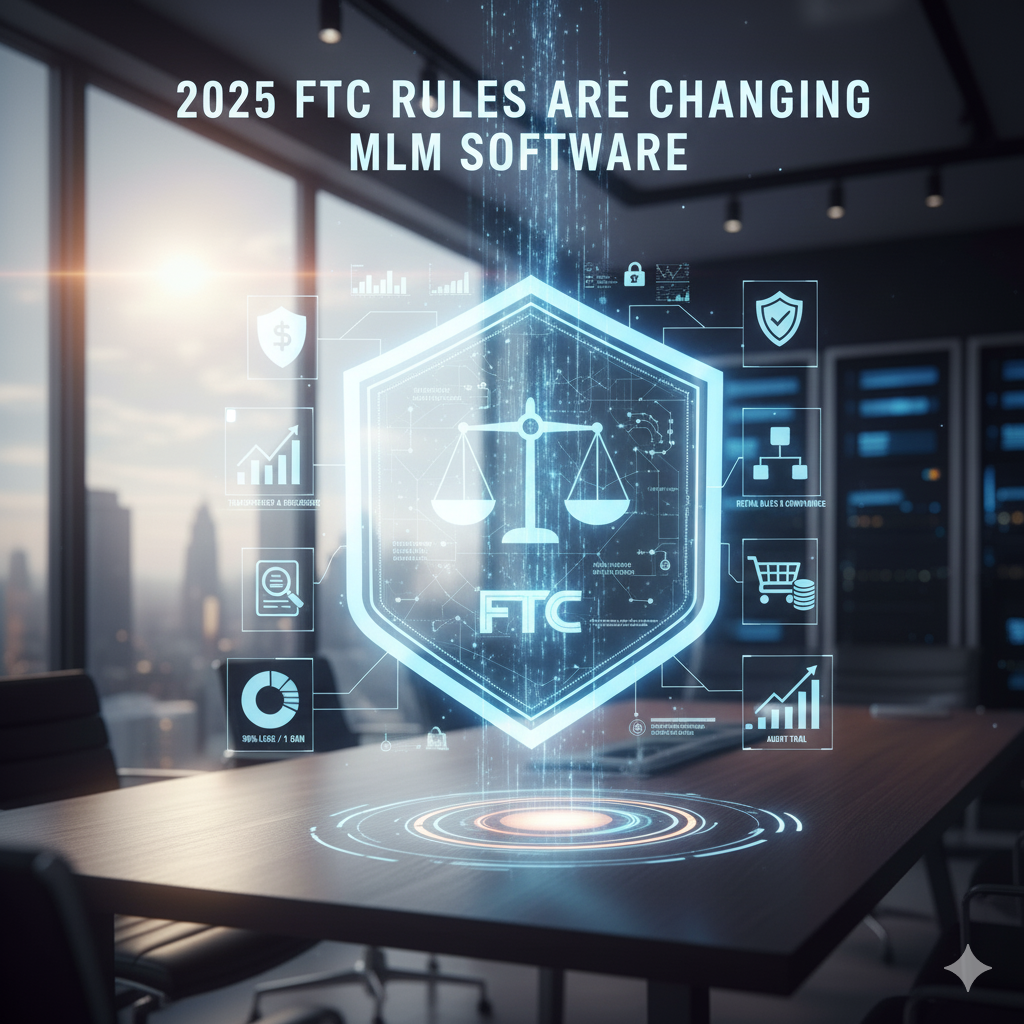FTC Rules Are Changing MLM Software, and the FTC is rolling out major regulatory updates for 2025 that will directly impact how MLM companies design and operate their software systems. If you’re an MLM business owner, software developer, or compliance officer, these new FTC rules for 2025 will require significant updates to your MLM software and compensation plans to remain compliant.
Who This Affects: MLM company owners, software developers building direct selling platforms, compliance teams, and anyone managing network marketing software systems.
The new regulations target three core areas that will reshape MLM software requirements. First, we’ll break down Understanding the New FTC Regulatory Framework for MLMs and the specific compliance features your platform must now include. Then we’ll cover Critical Compliance Changes MLM Software Must Address, such as mandatory income disclosure tools, automated cooling-off periods, and transparent data tracking—all of which need to be integrated into your system. Finally, we explore Building Proactive Compliance Programs in MLM Software, helping you develop platforms that automatically enforce FTC guidelines and protect your business from violations.
These changes aren’t optional—they’re coming whether the industry is ready or not. The companies that update and modernize their MLM software now will gain a major compliance, operational, and competitive advantage over those who scramble to adjust later.
Understanding the New FTC Regulatory Framework for MLMs

Expansion of the Business Opportunity Rule Requirements
The FTC’s proposed amendments to the Business Opportunity Rule represent a significant expansion of regulatory oversight that directly impacts MLM software development and compliance frameworks. Under these new provisions, the rule will now cover money-making opportunities including business coaching and investment opportunities that claim to assist consumers in building businesses or earning income. This expansion means that MLM software platforms must now accommodate broader compliance requirements beyond traditional network marketing structures.
The proposed rule amendments specifically prohibit sellers from making material misrepresentations, particularly regarding earnings claims. For MLM software systems, this translates to implementing robust tracking and documentation features that can automatically flag potentially misleading statements. Software platforms will need to integrate compliance monitoring tools that can identify and prevent the dissemination of unsubstantiated earnings representations throughout their networks.
A critical requirement under the expanded rule is that sellers must maintain written substantiation to back up any earnings claims and make this substantiation available to consumers upon request in the language used to make the original earnings claim. This mandate necessitates significant updates to MLM software architecture, requiring systems to store, organize, and retrieve substantiation documentation efficiently while ensuring multilingual support capabilities.
Implementation of New Earnings Claims Regulations
The proposed Earnings Claim Rule Regarding Multi-Level Marketing introduces comprehensive restrictions on how MLM companies can present income opportunities to potential recruits. This new rule specifically prohibits misleading earnings claims, making earnings claims without proper substantiation, and misrepresenting MLM opportunities as traditional employment opportunities.
MLM software systems must now incorporate advanced validation mechanisms to ensure all earnings-related content meets FTC compliance standards before distribution. These systems need to implement automated screening processes that can identify potentially deceptive earnings claims and prevent their circulation through digital marketing materials, participant dashboards, and recruitment tools.
The rule also mandates that MLM companies provide substantiation documentation to anyone upon request in the language of the original earnings claim. This requirement demands sophisticated document management capabilities within MLM software platforms, including multilingual support systems and automated response mechanisms for substantiation requests. Software developers must create user-friendly interfaces that allow compliance teams to quickly access and distribute required documentation while maintaining detailed audit trails.
Additionally, the proposed rule prohibits providing participants with recruitment materials containing deceptive earnings claims and requires maintaining comprehensive records of all substantiation materials. Modern MLM software must therefore integrate document version control systems and automated compliance checking features that scan all recruitment materials before they’re made available to distributors.
Updated Negative Option Rule for Auto-Shipments and Recurring Billing
While the reference content does not provide specific details about updates to the Negative Option Rule regarding auto-shipments and recurring billing within the context of the FTC’s 2025 MLM regulatory framework, the broader implications of enhanced FTC oversight suggest that MLM software systems handling recurring transactions will face increased scrutiny.
The emphasis on preventing deceptive practices and ensuring clear disclosure requirements means that MLM software platforms managing auto-ship programs and recurring billing cycles must implement enhanced transparency features. These systems will need to provide clear, conspicuous disclosures about recurring charges, cancellation procedures, and participant rights before processing any automatic transactions.
Software developers must prepare for potential additional requirements regarding consent mechanisms, cooling-off periods, and enhanced notification systems for recurring billing arrangements. The integration of these compliance features requires sophisticated billing management systems that can handle complex regulatory requirements while maintaining user-friendly experiences for MLM participants.
Given the FTC’s focus on consumer protection and the prevention of deceptive practices, MLM software platforms should anticipate implementing more rigorous consent verification processes, detailed transaction histories, and automated compliance reporting features for all recurring billing arrangements within their systems.
Critical Compliance Changes MLM Software Must Address

Mandatory Income Disclosure Integration Before Recruitment
MLM software platforms must now implement comprehensive income disclosure systems that automatically present detailed earnings information before any recruitment activities begin. This fundamental shift requires software developers to integrate mandatory disclosure workflows directly into their platforms, ensuring that potential recruits receive complete transparency about actual earnings within the network.
The new FTC regulations mandate that MLM software display accurate income statistics, including median earnings, percentage of participants earning specific amounts, and clear breakdowns of expenses versus actual profits. These disclosures cannot be buried in terms of service documents or presented as optional reading materials. Instead, MLM software must feature prominent, unavoidable disclosure screens that appear before any enrollment process can commence.
Modern MLM compliance software now incorporates dynamic income calculation engines that pull real-time data from compensation plans and participant earnings. These systems automatically generate standardized disclosure statements that comply with FTC formatting requirements, eliminating the possibility of misleading or incomplete income representations during the recruitment phase.
7-Day Waiting Period Implementation in Enrollment Systems
Previously, MLM software allowed immediate enrollment upon interest expression, but the updated FTC rules require a mandatory seven-day waiting period between initial contact and final enrollment. This cooling-off period must be hardcoded into MLM software systems, creating automated delays that cannot be bypassed by distributors or company administrators.
MLM software developers are implementing sophisticated timing mechanisms that track initial prospect interactions and automatically enforce the waiting period. During these seven days, the software continues presenting income disclosures and educational materials about the business opportunity, but prevents any enrollment transactions from completing.
The technical implementation involves creating prospect management workflows within the MLM software that maintain engagement while respecting the mandatory waiting period. These systems send automated follow-up communications, schedule disclosure reviews, and provide additional compliance materials, ensuring prospects remain informed throughout the cooling-off period before making final enrollment decisions.
Enhanced Documentation Requirements for Average Earnings and Costs
With the new FTC guidelines, MLM software must maintain comprehensive documentation of all earnings claims, average income calculations, and associated business costs. This requirement extends beyond simple transaction recording to include detailed expense tracking, time investment logging, and comprehensive profit-loss calculations for all network participants.
MLM software platforms now integrate advanced analytics engines that automatically calculate true average earnings by factoring in all business expenses, including product purchases, marketing costs, training fees, and time investments. These calculations must account for the total participant base, not just active sellers, providing realistic income expectations for potential recruits.
The documentation requirements also mandate that MLM software track and report the percentage of participants who achieve various income levels, the median time required to reach specific earnings thresholds, and the actual costs associated with maintaining active status within the compensation plan. This data must be readily accessible and automatically updated to reflect current network performance, ensuring all earnings claims presented to prospects remain accurate and substantiated by verifiable documentation.
Protecting Your MLM Business Through Amway Safeguards
Implementing Proper Buyback Policy Tracking
With the evolving FTC guidelines 2025, MLM software must incorporate robust buyback policy tracking mechanisms that mirror Amway’s comprehensive compliance framework. The software architecture should establish contractual rights and obligations for distributors, automatically documenting all buyback transactions and maintaining detailed records of returned inventory. This system must track the integrity of business operations by monitoring return patterns and flagging potential compliance issues before they escalate.
Modern compliant MLM compensation plans require automated buyback policy enforcement through system controls that prevent distributors from circumventing established procedures. The software should maintain comprehensive audit trails that document each stage of the buyback process, from initial request through final resolution, ensuring full transparency and regulatory compliance.
Preventing Inventory Loading Through System Controls
Now that we have covered buyback tracking, regulatory-ready MLM software must implement sophisticated controls to prevent inventory loading practices that violate FTC MLM regulations. Drawing from Amway’s enforcement mechanisms, including investigation protocols and disciplinary actions, MLM software should incorporate automated monitoring systems that analyze purchasing patterns and identify potential violations.
The software must establish clear parameters for acceptable inventory levels, automatically flagging unusual bulk purchases that could indicate inventory loading. These system controls should include warnings, purchase limitations, and escalation procedures that mirror Amway’s comprehensive enforcement approach. By implementing these safeguards, direct selling software can proactively identify and prevent practices that compromise MLM compliance.
Emphasizing Retail Sales Documentation and Self-Reporting Features
With this in mind, next, we’ll see how proper retail sales documentation becomes critical for maintaining FTC MLM compliance updates. Network marketing software must incorporate comprehensive tracking mechanisms that ensure truthful marketing practices and prevent misrepresentation, following Amway’s Rules of Conduct framework.
The system should require detailed documentation of all retail transactions, including customer information, product details, and sales verification. Self-reporting features must be integrated to allow distributors to accurately report their retail sales activities while providing the company with real-time compliance monitoring capabilities.
MLM automation tools should enforce compliance through review mechanisms and training modules that educate distributors on proper documentation requirements. The software must maintain detailed records that can support regulatory reviews and demonstrate adherence to all applicable laws and regulations, ensuring the long-term viability of the MLM business model.
Revamping Earnings Claims and Marketing Compliance

Eliminating Broad Income Statements in Marketing Materials
Now that we understand the new FTC regulatory framework, the proposed Earnings Claim Rule Regarding Multi-Level Marketing fundamentally transforms how MLM software must handle earnings-related communications. The FTC explicitly prohibits misleading earnings claims and requires MLM compliance systems to prevent distributors from making earnings claims without proper substantiation or reasonable basis.
Compliant MLM compensation plans must now incorporate automated controls that flag and prevent broad income statements like “unlimited earning potential” or “make $10,000 monthly” without documented proof. Modern regulatory-ready MLM software must implement real-time content filtering that automatically identifies and blocks unsubstantiated earnings claims before they reach prospects.
The new FTC MLM regulations specifically target misrepresentations that prevent consumers from accessing truthful earnings information. This means direct selling software platforms must maintain comprehensive databases of actual participant earnings to counter any inflated claims with verifiable data.
Creating Pre-Approved Legal Templates for Distributor Use
Previously, distributors often created their own marketing materials with little oversight. With the FTC guidelines 2025 requirements, network marketing software must provide distributors with pre-approved, legally vetted templates that comply with substantiation requirements.
These templates must include mandatory language that reflects actual earnings data rather than hypothetical scenarios. MLM automation systems should restrict distributors to using only approved materials, preventing the circulation of non-compliant content. The software must also maintain audit trails showing which distributors accessed which templates and when they were used.
The proposed rule requires MLM companies to provide substantiation in the same language as the earnings claim, meaning multi-language template systems must include corresponding documentation for each linguistic version.
Implementing Robust Disclaimer Requirements for Testimonials
With this regulatory shift in mind, the FTC MLM compliance updates mandate that all testimonials include clear disclaimers about typical earnings expectations. MLM software platforms must automatically append required disclaimers to any testimonial content, ensuring compliance without relying on manual distributor compliance.
These disclaimers cannot be buried in fine print but must be “clear and conspicuous” according to FTC standards. The software should enforce font size, placement, and visibility requirements for all disclaimer text. Additionally, testimonial management systems must maintain records linking each testimonial to its supporting substantiation data, as required by the proposed rule’s record-keeping provisions.
FTC Rules Are Changing MLM Software by requiring these automated compliance features that prevent violations before they occur, rather than addressing them after the fact.
Building Proactive Compliance Programs in MLM Software
Developing Smart Earnings Disclosure Statements Integration
With the evolving FTC regulations, MLM software must now integrate sophisticated earnings disclosure capabilities that go beyond basic reporting. Modern regulatory-ready MLM software needs to automatically generate detailed earnings and sales reports that reflect actual commission data and sales performance. This integration should support distributors in making accurate earnings claims while maintaining FTC MLM compliance.
The software must facilitate a comprehensive system where distributors can report their business expenses alongside supporting documentation. This dual-tracking approach enables companies to showcase the actual net profit that distributors achieve, providing transparency that aligns with FTC guidelines 2025. The earnings disclosure integration should automatically calculate and display realistic income expectations based on historical data, helping prevent misleading income representations.
Creating Internal Audit and Compliance Officer Features
Now that earnings disclosure systems are established, the next critical component involves building robust internal oversight capabilities. Compliant MLM compensation plans require continuous monitoring through dedicated audit features that track suspicious recruitment patterns and unusual genealogy tree growth.
The MLM software should include specialized compliance officer dashboards that provide real-time visibility into distributor activities, compensation calculations, and potential red flags. These features must support comprehensive Know Your Customer (KYC) processes, including document collection, validation, and approval workflows to ensure only verified individuals join the network.
Internal audit capabilities should encompass accurate payout processing systems that calculate commissions with precision, factoring in bonuses, ranks, overrides, and deductions. The software must maintain timely payout execution to prevent agreement violations while automating the entire process to reduce human error and ensure consistent FTC MLM compliance updates.
Implementing Scalable Distributor Training and Monitoring Systems
Previously established audit systems now require support from comprehensive training and monitoring frameworks. Direct selling software must incorporate scalable educational modules that keep distributors informed about compliance requirements and proper business practices.
The monitoring systems should integrate seamlessly with compensation plan management, allowing real-time tracking of distributor performance and compliance adherence. This includes maintaining FTC-compliant record-keeping that covers distributor agreements, income claims, marketing materials, and complete transactional history in secure, structured data storage.
Network marketing software with effective monitoring capabilities enables proactive identification of compliance issues before they escalate. The system should support multiple compensation structures including binary, unilevel, and matrix plans while continuously monitoring for irregular patterns that might indicate compliance violations.
These scalable systems must accommodate business growth while maintaining consistent compliance standards across all distributor levels, ensuring that MLM automation enhances rather than compromises regulatory adherence.

The 2025 FTC regulatory changes represent a fundamental shift in how MLM companies must operate, from mandatory income disclosures and waiting periods to stricter earnings claims requirements and enhanced transparency measures. MLM software must evolve to accommodate these compliance demands while maintaining the operational efficiency that drives business growth. Companies that proactively integrate Amway safeguards, implement robust compliance tracking, and build automated disclosure systems into their software platforms will be best positioned to thrive under the new regulatory framework.
The stakes have never been higher for MLM businesses. With the FTC taking an increasingly aggressive enforcement approach, having compliant software isn’t just about avoiding penalties—it’s about building a sustainable, legally defensible business model. Now is the time to audit your current systems, upgrade your MLM software to meet 2025 compliance standards, and establish proactive monitoring programs that protect your business while enabling continued growth in this evolving regulatory landscape.


